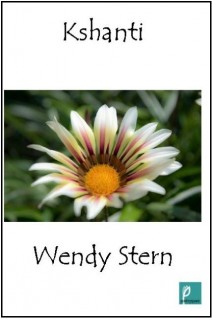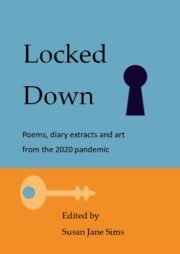Wendy Stern’s Kshanti, Poetry Space Ltd, 32pp, ISBN 978-1-909404-22-9
I am delighted with the response we have had so far for Kshanti by the late Wendy Stern.
Here is what Valerie Morton had to say:
This pamphlet of just sixteen poems is published by The Poetry Space – just sixteen poems yet each one so powerful and intensely inspiring that the reader is left feeling that this is a full collection. Wendy’s death in 2015 followed years of being completely bedridden – that these poems were written without the ability to use pen, paper, or keyboard, is a testament to the remarkable strength and commitment of a courageous poet and to the dedicated carers who took down dictation and revised and edited as Wendy spoke.
In Sanskrit Kshanti means ‘patience, forbearance’ ‘unaffected by’ or ‘able to withstand’ – the ability to endure personal hardship, acceptance of the truth, and remain undefeated.
There is a dignity in this writing which invites the reader to focus on the poems dispassionately – Wendy’s direct and honest insight into her own suffering is humbling. In this creative response to her helplessness, these brave and energetic poems never shy away from the reality of her situation:
Read the full review at The Poetry Shed
Lizzie Ballagher too was very moved by this collection:
Comments by Jason Barber (editor of Buddhist Poetry Review); by poet John Siddique (judge of Poetry Space’s 2015 Competition); and by Malcolm Stern, Wendy’s father—all have perhaps said what needs to be said about Wendy’s faith and about her craft as a poet. Why, then, write another review? Well, quite simply, I wanted to offer another woman’s perspective.
Kshanti took my breath away: not once, but several times. Because of her suffering, Stern describes herself as “this beaten woman” and “this caged-in child”, but there’s nothing subdued or claustrophobic about the voice that readers hear in her poems. Instead, her work is direct and immediate, a feat achieved by her skilled, economical choice of language:
“You bring your news / And I am drowned again…”
“I will have to, it seems, / Shed my skin for you,
And let it fall to my feet, /So you may see the very bones of me.”
Sometimes it is that haunting second person pronoun “you” that rivets the reader’s attention; at other times it is the carefully chosen verb, often repeated, that seems to drill down into our consciousness:
“Take
This shattered mind / And let the dust fragments
Blow out / To the furthest of seas.
Take
This woman’s life / And give all the pieces
Up to you / In your sweet name.”
The poems that drew me most were “To all that is left”, “Re-envisage” and “Trapped on the inside”. Here Stern faces her illness with unflinching honesty and (almost) joyful, unexpected hope; she re-imagines her constricted world in new ways:
“Here is a bowl, / a bowl of warm water.
let the bowl be your lake / and the lake be your sea.”
She then writes triumphantly on the final page of the collection of how she is able to surrender herself to death in the same way that she might free a trapped butterfly from a window.
“Life came to me today, / Trapped on the inside for once.
I set it free.”
Her lips and pen may be silent now, but her voice still rings from these pages.








